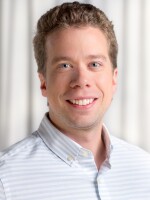As part of a series called My Big Break, All Things Considered is collecting stories of triumph, big and small. These are the moments when everything seems to click, and people leap forward into their careers.
On stage, Jim Gaffigan comes off as an everyday kind of guy. Bearded, pale, the comedian riffs on the mundane stuff — like Hot Pockets, doughnuts and family vacations to Disneyland.
Still, don't let that fool you: In the cutthroat world of comedy, he's made it. He's about to hit the the road with a national tour, and The Jim Gaffigan Show just premiered on TV Land this week.
It's something of a fulfillment of the ambitious dreams he's harbored since he was young; as a kid, he had a romantic notion of getting into the entertainment industry. But for a long time, those hopes of hitting it big seemed so far away.
"I grew up in a small town in Indiana, where there was no one that had a cousin in the entertainment industry," Gaffigan says. "The closest thing to the entertainment industry was the marching band. I think it was a very successful marching band, to be fair to them."
When Gaffigan moved to New York City after college, he was still a long way from the spotlight. He was stuck in a cubicle as an account manager.
"I was working in advertising while I was developing stand-up — essentially bombing," he recalls.
He would work his 9-to-5 job, then go to an acting class and do a stand-up gig at a local club. When he got into work the next morning, he'd be so tired from the previous night that he would take naps in his cubicle.
Luckily for him, his colleagues thought his napping just habits made him "eccentric." But his bosses were a different matter. It was only a matter of time before management noticed.
"They had to wake me up to fire me," he says. "My boss had to shake me. ... She was like, 'I'm going to have to lay you off.' "
It turns out that getting fired was the best thing that could've happened to him. His money was saved up, and he had some experience on stage and lots of material to work with.
So he pursued stand-up full-time. Still, Gaffigan says it was a long road to success.
"I think I'd been doing stand-up for seven or eight years," he says. "And I was not really getting much success or traction. And I would audition for things and the person that I would be auditioning for would literally leave the room. Just a lot of bad luck."
He knew that an appearance on a late-night talk show would turn things around. Gaffigan grew up watching David Letterman, and he'd always looked up to the longtime host. So he auditioned for a spot on the Late Show — and made the cut.
When he finally made his debut in January 1999, Gaffigan found himself performing in front of the whole country.
"My big break was appearing on [Letterman's show]. It was a big deal," Gaffigan says. "And the weird thing is, because Letterman thought I was good, everyone changed their mind. It changed the narrative surrounding me, completely. ... It's just a strange transformation. Someone essentially turns on a light switch, and it just changes."
We want to hear about your big break. Send us an email at mybigbreak@npr.org.
Copyright 2022 NPR. To see more, visit https://www.npr.org.





